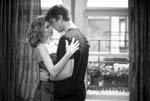The trailer for Paul McGuigan's "Wicker Park" wrongly portrays the film as a thriller, a sort of Generation X "Fatal Attraction." While it certainly has its darker elements (many of the plot points and characters are undeniably Hitchcockian), the film itself doesn't pack nearly the level of adrenaline that its preview suggests it does. This is definitely a strange, frequently suspenseful account of romantic fixation, but one that actually doesn't fit neatly into any genre, and certainly not that of a thriller.
Set in Chicago (as its title should suggest), "Wicker Park" is an account of the collision between new and old loves, featuring an arsenal of plot twists that ultimately unveil a sort of romantic quadrangle. After two years away, young ad executive Matt (Josh Hartnett) has returned to his former Windy City stomping grounds with his new fiancée (Jessica Paré). Preparing to leave for business meetings in Shanghai, he overhears (in one of the picture's many, many moments of coincidence, some more believable than others) what he thinks is the voice of his former love Lisa (Diane Kruger) in a restaurant phone booth. Lisa, who broke his heart back when he was just a young photography enthusiast, runs from the restaurant before Matt can catch her, initiating a convoluted quest to find his former flame.
With the help of his old best friend Luke (Matthew Lillard, stifling the goofiness that has dominated nearly all of his other roles), Matt finally catches up with the phantom lady from the restaurant, who is not his ex-girlfriend but a different young woman (Rose Byrne), who seems to also be named Lisa. Via an increasingly complicated narrative, these four weave a tangled web of romantic attachments (both old and new).
The structure of the film is appropriately indirect: there are numerous flashbacks to earlier events (particularly those that reveal details of Matt's and Lisa's relationship), but the picture also rewinds to reexamine already-seen moments, exposing their secrets (the unbeknownst presence of an eavesdropping observer, for example). This is occasionally confusing, as the flashbacks are so prevalent that it becomes difficult to distinguish where the various scenes are in relation to one another; it isn't always easy to position each moment in the story's chronology.
The main problem with this increasingly frustrating, lopsided tale is that the script (or perhaps the cast) never applies the appropriate level of urgency to any of the film's events. Secrets are kept, revealed; bonds are frayed, mended, but the characters and scenarios involved aren't developed or engaging enough to make the audience care very much.
"Wicker Park" is a remake of a 1996 French film, "L'Appartement," which capitalizes further on the Hitchcockian elements present here (and is, by all accounts, a superior effort). The final scene of this version, offensively scored to Coldplay's "The Scientist," feels like it belongs in a completely different movie, one in which such a romance film cliché (it is set in an airport terminal) might be marginally acceptable. "Wicker Park," however, is not that film; it is a story of obsession, and the filmmakers can't straddle such genre lines as comfortably as they'd perhaps like to.



Comments
Use the comment form below to begin a discussion about this content.